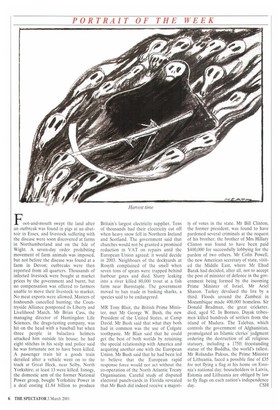PORTRAIT OF THE WEEK
Foot-and-mouth swept the land after an outbreak was found in pigs at an abattoir in Essex, and livestock suffering with the disease were soon discovered at farms in Northumberland and on the Isle of Wight. A seven-day order prohibiting movement of farm animals was imposed, but not before the disease was found at a farm in Devon; outbreaks were then reported from all quarters. Thousands of infected livestock were bought at market prices by the government and burnt, but no compensation was offered to farmers unable to move their livestock to market. No meat exports were allowed. Masters of foxhounds cancelled hunting; the Countryside Alliance postponed its Liberty and Livelihood March. Mr Brian Cass, the managing director of Huntingdon Life Sciences, the drugs-testing company, was hit on the head with a baseball bat when three people in balaclava helmets attacked him outside his house; he had eight stitches in his scalp and police said he was fortunate not to have been killed. A passenger train hit a goods train derailed after a vehicle went on to the track at Great Heck, near Selby, North Yorkshire; at least 13 were killed. Innogy, the domestic arm of the former National Power group, bought Yorkshire Power in a deal costing £1.84 billion to produce
Britain's largest electricity supplier. Tens of thousands had their electricity cut off when heavy snow fell in Northern Ireland and Scotland. The government said that churches would not be granted a promised reduction in VAT on repairs until the European Union agreed; it would decide in 2003. Neighbours of the dockyards at Rosyth complained of the smell when seven tons of sprats were trapped behind harbour gates and died. Slurry leaking into a river killed 80,000 trout at a fish farm near Barnstaple. The government moved to ban trade in basking sharks, a species said to be endangered.
MR Tony Blair, the British Prime Minister, met Mr George W. Bush, the new President of the United States, at Camp David. Mr Bush said that what they both had in common was the use of Colgate toothpaste. Mr Blair said that he could get the best of both worlds by retaining the special relationship with America and acquiring another one with the European Union. Mr Bush said that he had been led to believe that the European rapid response force would not act without the co-operation of the North Atlantic Treaty Organisation. Careful study of disputed electoral punch-cards in Florida revealed that Mr Bush did indeed receive a majori ty of votes in the state. Mr Bill Clinton, the former president, was found to have pardoned several criminals at the request of his brother; the brother of Mrs Hillary Clinton was found to have been paid $400,000 for successfully lobbying for the pardon of two others. Mr Colin Powell, the new American secretary of state, visited the Middle East, where Mr Ehud Barak had decided, after all, not to accept the post of minister of defence in the government being formed by the incoming Prime Minister of Israel, Mr Ariel Sharon. Turkey devalued the lira by a third. Floods around the Zambezi in Mozambique made 400,000 homeless. Sir Donald Bradman, the great cricketer, died, aged 92. In Borneo, Dayak tribesmen killed hundreds of settlers from the island of Madura. The Taleban, which controls the government of Afghanistan, promulgated an Islamic clerics' judgment ordering the destruction of all religious statuary, including a 175ft freestanding statue of the Buddha, the world's tallest. Mr Rolandas Paksas, the Prime Minister of Lithuania, faced a possible fine of £35 for not flying a flag at his home on Estonia's national day; householders in Latvia, Estonia and Lithuania are obliged by law to fly flags on each nation's independence
day. CSH












































































 Previous page
Previous page